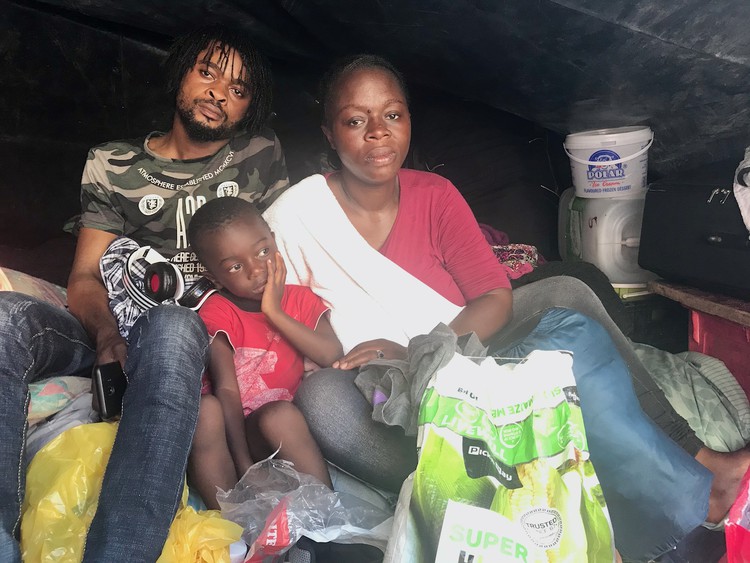Greenmarket Square traders want protesting refugees removed
“We have lost five months of business” says trader
“We make money in summer and have lost five months of business. We are not against these people, [but] they are taking bread from our mouths. The city council still expects us to pay rent,” an irate trader on Greenmarket Square, Cape Town, told GroundUp.
On Monday, Judge Daniel Thulare granted an interim order that prohibits the refugees who are staying inside and outside the Central Methodist Mission (which is on Greenmarket Square) from making fires and cooking, urinating and defecating or washing clothes outside.
The interdict will come into effect in the next seven days after the City has provided a venue for a process of documentation verification. The refugees have been protesting in the city centre since October, demanding to be resettled in other countries because they say they are not safe in South Africa.
“For us there was no judgment, nothing was done,” said the trader.
The Tudor Hotel, which is next to the church, is closed. The management and owners of restaurants and hotels in the area are angry. Most, however, refused to speak about the situation.
But Simba Kaparepare, a trader, was blunt. “These people should go back where they came from. They can afford to pay rent. I see them buying cool drinks and fast foods, but I can’t even buy myself a bottle of water. My family and my parents in Zimbabwe are dependent on this business. They defecate and urinate everywhere. Customers are scared of them.”
Lillian Kukangwa from the DRC was furious. “They must remove them … not tell them don’t bathe, don’t cook.”
The Greenmarket Traders Association wrote to Mayor Dan Plato in November asking government leaders to resolve the situation.
Reverend Alan Storey of the Methodist Mission said in a statement on Wednesday: “My hope is that this Judgement will draw all those involved in this protest closer to the truth of their own situation and move them to vacate the area and the church as soon as possible. Furthermore, I hope that everyone, including those inside the church will use the opportunity afforded to them by the judgement to seek assistance should they need.”
Suzane Kabasele, a refugee from DRC, was dressing her child in a makeshift shelter. She was surrounded by utensils – a pan of braaied fish, a bag of maize meal and coal. She said she is waiting for The United Nations High Commissioner for Refugees (UNHCR) to begin a resettlement exercise.
“I stayed in more than three townships but there was no peace. My neighbours wanted to kill me. On the train they threatened to kill me. They wanted to kill me for the small job I was doing of selling airtime and SIM cards. Leaders explained to us that we are not allowed to cook and wash outside but I am a human being. I still need to eat and wash. I will cook unless the City will provide food,” said Kabasele.
Melchi Kazadi, from the DRC, said his fisheries business was looted and destroyed on 3 September in xenophobic violence in Alexandra, Johannesburg. “Our protest is against UNHCR but they never come to us to listen to our grievances. We depend on UNHCR. They must come and execute their mandate.”
Spokesperson for UNHCR Heinn Shin told GoundUp that the organisation has been engaged in a series of regular meetings with the government, NGOs, as well as the protesters, since the sit-in started in October.
“UNHCR is not in position to resettle or relocate protesters to a third country. Neither group nor individual interviews with the protesters at the Central Methodist Church will be conducted as resettlement is an option for a very small percentage of displaced persons globally.
“In order to protect the integrity of the process, there will be no priority given to this group. All refugees and asylum-seekers have equal access to UNHCR services.
“Refugees and asylum-seekers in South Africa are protected by the country’s laws and policies, and UNHCR’s program in South Africa focuses on advocacy and support to local integration. UNHCR remains concerned about the misinformation being circulated by the self-claimed protest leaders.”
In his judgment, Judge Thulare was scathing of the refugee leaders JP Balous and Papy Sukami. “They were aware that their demand to be resettled was unlikely to happen and yet they encouraged its indefinite sustenance. They were aware that their continued sit-in protest would also not miraculously translate into them being granted access to housing,” he said.
The judge also slammed the way the City had failed to deal with the situation. “Property prices plummeted. Businesses were affected. European travel advisories were issued warning tourists against visiting Cape Town. Hotel guests were scared off. Hotel managers were threatened,” he said.
Next: Province raps City’s knuckles over state of rivers
Previous: Farm worker challenges authorities in court over housing
© 2020 GroundUp.
This article is licensed under a Creative Commons Attribution-NoDerivatives 4.0 International License.
You may republish this article, so long as you credit the authors and GroundUp, and do not change the text. Please include a link back to the original article.



